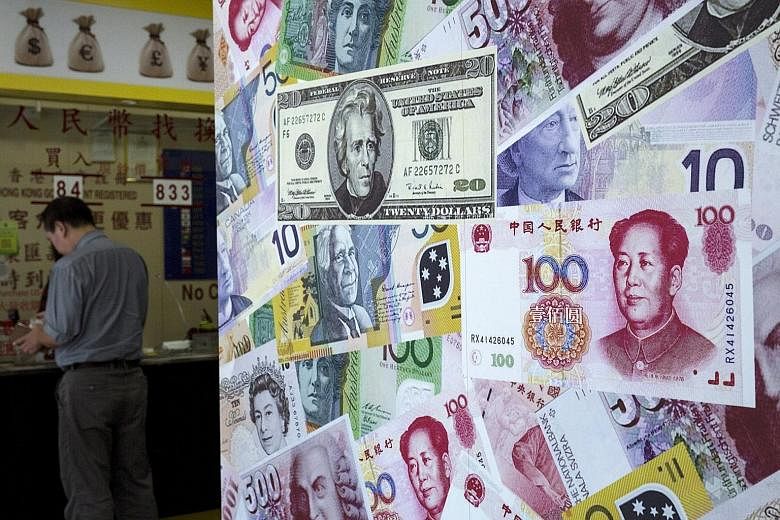Currency markets have had a tumultuous start to the year following a volatile 2015, prompting some Singapore firms to pay closer attention to foreign exchange hedging.
Banks say they have seen an uptick in demand for hedging products from large firms as well as small and medium-sized enterprises (SMEs).
Swings in currencies can make or break profits for companies that source from abroad or are exporters. A hedging strategy allows firms negotiating deals in foreign currencies to plan for potential volatility by locking in an exchange rate and thus securing margins in advance. It is equivalent to insuring against rising prices.
Many of the currencies Singapore firms frequently trade in have experienced significant volatility of late, including the yuan, ringgit and greenback. Ms Wee Wei Min, OCBC Bank's head of treasury advisory, said more corporates are exploring hedging solutions - especially firms that need to buy US dollars.
The greenback has been strengthening against the Singdollar and other regional currencies, as investors anticipate further interest rate hikes in the US.
Ms Eileen Chia, UOB's head of global market sales, said currency hedging activity among its large corporate customers rose more than 50 per cent in 2015, while the volume from mid- to large-sized SMEs increased by about 15 per cent "as these enterprises became more aware of the importance of hedging against currency risks".
"Besides the Singapore dollar, our customers are also hedging the ringgit and the yuan against the US dollar, reflecting the roles of China and Malaysia as Singapore's top two trading partners," she said. There is also growing interest in hedging the Indonesian rupiah and Thai baht against the US dollar as firms expand in the region, she added.
Mr Teo Kang Heng, DBS' managing director of corporate advisory group, treasury and markets, said it has advised clients to hedge against possible slides in the Singdollar, yuan, Australian dollar and euro.
Companies with international dealings said currency volatility has been a major concern of late.
Ms Jessie Koh, XMH Holdings' finance director, said it expects to relook its foreign exchange exposure more frequently this year, given currency market swings. XMH is a diesel engine, propulsion and power- generating solutions provider in the marine and industrial sectors.
"We make most of our purchases in yen, as well as a fair bit in the US dollar and euro," she said.
"In the past we would relook our exposure maybe two or three times a year, then close the books and put them aside. We're now going to monitor this more closely... We'll have to take a position more frequently than we did in the past."
Mr Chan Chong Beng, chairman of Goodrich Global, said the interior furnishing firm takes a position on the US dollar roughly every six months. The Singapore-headquartered firm has a presence in eight countries, including China, Indonesia and Malaysia.
"Most of our bills are in US dollars. Importers like us have suffered because the US dollar has strengthened against the Singdollar and other regional currencies," he said.
Meanwhile, others have benefited from the strengthening greenback. Mr Loy Suan Liang, chief financial officer of Fagerdala Group, said the company used to purchase currency forwards for the greenback but stopped "when we saw the US dollar on a firm uptrend".
A sizeable portion of the protective packaging manufacturer's revenue is in US dollars.
Still, most SMEs do not have a formal hedging policy, noted the president of the Association of Small and Medium Enterprises, Mr Kurt Wee.
"Forex risks can erode short- term gains, but it hasn't reached a point where volatility is affecting companies in fundamental ways," he added.


